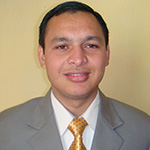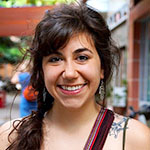In Summer 2015, the Department of Natural Resources and Environmental Sciences (NRES) and Institute for Sustainability, Energy, and Environment (iSEE) announced funding awards for three University of Illinois at Urbana-Champaign graduate students researching the impacts of climate change on public health. You can read the full news release here.
Here is a closer look at the three students researching issues related to climate change and public health:
 Surendra Karki
Surendra Karki
Karki studies Pathobiology and will work with Marilyn O’Hara Ruiz, Clinical Associate Professor and Director of the GIS and Spatial Analysis Lab in the U of I Department of Pathobiology, and Nancy Westcott, Research Atmospheric Scientist at the Midwestern Regional Climate Center in the Illinois State Water Survey. His description of his research project:
“The weather can influence the number of mosquitoes in an area, affecting the degree to which people are exposed to a mosquito that carries a pathogen, such as West Nile virus (WNV). In past work, our research has demonstrated that WNV mosquito infection is higher with higher temperatures and lower precipitation. This prior work, however, has been based on averages, and has not taken into account the possible effects of extreme events in which rainfall or temperature are much higher or lower than average. These types of events are the possible outcomes of climate change. The relationship between mosquito abundance and precipitation is likewise complex. Water is required for mosquitoes to deposit their eggs, but large rainfall events might wash out the eggs and larvae. My research will explore and model the relationship between vector mosquito abundance and WNV infection rates with a particular interest in the effect of extreme rainfall events and increased temperatures in the Chicago area. This will allow incorporating this knowledge into an extended risk model of WNV risk that takes into account the effects of both weather and climate change.”
Karki’s April 2016 final presentation on his research.
His November 2015 presentation.
 Nora Sadik
Nora Sadik
Sadik, who studies Civil and Environmental Engineering, will work with with Illinois CEE Professor Helen Than Nguyen, Illinois Microbiology Professor Joanna Shisler and Makerere University (Uganda) Agricultural and Bio-Systems Engineering Professor Noble Banadda. Her description of her project:
“Poor water quality and limited sanitation is responsible for approximately 3.5 billion diarrheal episodes and 1.87 million diarrhea-related deaths in children under 5 each year. Most diarrhea incidence occurs in the developing world, where climate change is argued to have the greatest impact. In cities such as Kampala, Uganda, the majority of the population resides in informal settlements that lack adequate economic capacity and infrastructure resilience to combat climate-induced impacts such as property damage and disease outbreak. With the support from the Warren Lavey and Dr. Holly Rosencranz Research Award, I will travel to Uganda during the summer of 2016 to investigate the effects of climate change and seasonal rains on water quality and public health in Kampala. Over two months, an assisting Makerere University student and I will conduct water quality tests for 16 water sources in Kampala, including protected springs, public taps, and runoff streams. I hypothesize that frequent cycles of drought and heavy precipitation events affect the microbial communities of Kampala water sources, fostering an environment favorable for microbes that cause human disease. With my research, I hope to create a model from which disease outbreaks can be predicted based on climate and water monitoring, allowing scientists to give climate change adaptation recommendations that may assist in preventing disease outbreak.”
Sadik’s November 2015 presentation on her research.
READ MORE ABOUT SADIK AND HER WORK ON HER WEBSITE.
 Erin Welsh
Erin Welsh
Welsh studies Integrative Biology and will work with Illinois Entomology Professor Brian Allan and Dr. Jose Loaiza of INDICASAT in Panama. Here is how she describes her project:
“This research project will evaluate the potential effects of climate change on tick-borne disease in the Neotropics using a combination of experimental enclosures, field surveys, and genomic analyses. Climate change is likely to alter tick-borne disease through shifts in current tick ranges or alteration of host densities and distributions. Understanding the abiotic and biotic determinants of current tick distributions is essential for predicting how climate change might alter tick-borne disease risk. This project uses a natural precipitation gradient spanning central Panama as a proxy for climate change, with conditions on the dry side representative of future conditions for wetter regions nearby. At each of three national parks along the gradient, field sampling of ticks and camera traps will be employed to evaluate how ticks and their hosts are currently distributed both spatially and temporally. Additionally, survival enclosures will be established at each site to measure relative survival of tick communities under different climate regimes. Collected ticks will undergo pathogen screening to determine the prevalence of various tick-borne microbes of human health importance. Ultimately, this information will be integrated into a structural equation model to test the direction and strength of relationships among abiotic and biotic factors determining tick-borne disease risk.”
Welsh’s November 2015 presentation on her research.
And her April 2016 update: “This year I attended the US-IALE (International Association of Landscape Ecology) conference in Asheville, N.C., where I gave a presentation on my research. In addition, I received the NASA-MSU Professional Enhancement Award to help me with fees related to attending this conference. I plan on attending conferences for both EEID (Ecology and Evolution of Infectious Disease) conference in June and ESA (Ecological Society of America) in August, where I will also present my research. I’m currently in Panama for an extended field season, where I am continuing to survey ticks and establish camera traps. Photos coming soon!”